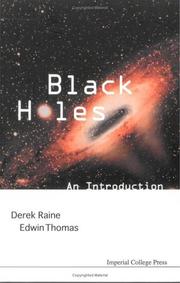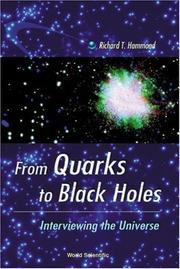| Listing 1 - 10 of 112 | << page >> |
Sort by
|
Book
Year: 2020 Publisher: London : IntechOpen,
Abstract | Keywords | Export | Availability | Bookmark
 Loading...
Loading...Choose an application
- Reference Manager
- EndNote
- RefWorks (Direct export to RefWorks)
Book
ISBN: 039449086X Year: 1974 Publisher: New York Random House
Abstract | Keywords | Export | Availability | Bookmark
 Loading...
Loading...Choose an application
- Reference Manager
- EndNote
- RefWorks (Direct export to RefWorks)
Book
ISBN: 1283039648 9786613039644 2759803341 Year: 2009 Publisher: Les Ulis : EDP Sciences,
Abstract | Keywords | Export | Availability | Bookmark
 Loading...
Loading...Choose an application
- Reference Manager
- EndNote
- RefWorks (Direct export to RefWorks)
Découverts par hasard au début des années soixante, les quasars sont les astres les plus lumineux et les plus distants de l'Univers. Leur puissance vertigineuse est produite dans une région absolument minuscule. On conçoit donc aisément combien ils ont suscité d'intérêt, tant par les phénomènes extraordinaires qui y sont en jeu, que par leurs distances qui en font des sondes de l'Univers lointain et de son passé. On a mis presque vingt ans à admettre qu'ils tiraient leur puissance de la présence d'un trou noir géant en leur sein, et encore vingt autres années à se convaincre que la plupart des galaxies, et même la Voie lactée, contiennent de tels trous noirs qui sont les cadavres des quasars du passé. L'histoire des quasars permet mieux que toute autre d'illustrer le cheminement erratique de la science. Elle montre comment une discipline finit par se structurer après un demi-siècle d'errance, pour déboucher sur un modèle physique cohérent et sur une nouvelle vision de la structuration de l'Univers et de l'évolution des galaxies. Suzy Collin-Zahn est astronome à l'Observatoire de Paris-Meudon. Elle a participé à cette histoire.
Book
Year: 1987 Publisher: Marshall Space Flight Center, AL : Space Science Laboratory,
Abstract | Keywords | Export | Availability | Bookmark
 Loading...
Loading...Choose an application
- Reference Manager
- EndNote
- RefWorks (Direct export to RefWorks)
Book
ISBN: 9780307948489 030794848X Year: 2017 Publisher: New York Anchor Books
Abstract | Keywords | Export | Availability | Bookmark
 Loading...
Loading...Choose an application
- Reference Manager
- EndNote
- RefWorks (Direct export to RefWorks)
"In 1916, Einstein became the first to predict the existence of gravitational waves: sounds without a material medium generated by the unfathomably energy-producing collision of black holes. Now, Janna Levin, herself an astrophysicist, recounts the story of the search, over the last fifty years, for these elusive waves--a quest that has culminated in the creation of the most expensive project ever funded by the National Science Foundation ($1 billion-plus). She makes clear how the waves are created in the cosmic collision of black holes, and why the waves can never be detected by telescope. And, most revealingly, she delves into the lives and fates of the four scientists currently engaged in--and obsessed with--discerning this soundtrack of the universe's history. Levin's account of the surprises, disappointments, achievements, and risks of this unfolding story provides us with a uniquely compelling and intimate portrait of the people and processes of modern science"--

ISBN: 1860945864 1860945880 Year: 2005 Publisher: London Imperial College Press
Abstract | Keywords | Export | Availability | Bookmark
 Loading...
Loading...Choose an application
- Reference Manager
- EndNote
- RefWorks (Direct export to RefWorks)
Book
Year: 2019 Publisher: Washington : U.S. Government Publishing Office,
Abstract | Keywords | Export | Availability | Bookmark
 Loading...
Loading...Choose an application
- Reference Manager
- EndNote
- RefWorks (Direct export to RefWorks)
Telescopes --- Black holes (Astronomy) --- Outer space --- Exploration.
Book
ISBN: 0323956378 032395636X 9780323956376 Year: 2024 Publisher: San Diego : Elsevier,
Abstract | Keywords | Export | Availability | Bookmark
 Loading...
Loading...Choose an application
- Reference Manager
- EndNote
- RefWorks (Direct export to RefWorks)
This comprehensive volume explores the formation, evolution, and observational aspects of black holes in various astronomical contexts. Edited by leading researchers, it covers topics such as stellar and binary black hole systems, black holes in star clusters and dwarf galaxies, and massive black holes in galactic nuclei. The book also delves into the theoretical and observational understanding of primordial black holes and their role in cosmology. Intended for astronomers, astrophysicists, and advanced students, it aims to provide a nuanced understanding of black holes' influence on cosmic structures and their detection through gravitational waves and electromagnetic signals.
Black holes (Astronomy) --- Gravitational waves. --- Gravitational waves
Book
ISBN: 3540063765 0387063765 3540469834 9783540063766 Year: 1973 Volume: 69 Publisher: Berlin : Springer,
Abstract | Keywords | Export | Availability | Bookmark
 Loading...
Loading...Choose an application
- Reference Manager
- EndNote
- RefWorks (Direct export to RefWorks)
Physics --- 524.3 --- Stars --- Black holes (Astronomy) --- Neutron stars. --- Black holes (Astronomy). --- 524.3 Stars

ISBN: 9810246250 Year: 2001 Publisher: River Edge, NJ : World Scientific,
Abstract | Keywords | Export | Availability | Bookmark
 Loading...
Loading...Choose an application
- Reference Manager
- EndNote
- RefWorks (Direct export to RefWorks)
| Listing 1 - 10 of 112 | << page >> |
Sort by
|

 Search
Search Feedback
Feedback About UniCat
About UniCat  Help
Help News
News